Albanians are one of the oldest peoples of the Balkan Peninsula and it is believed that their origins go back to Illyrians. The Albanians living in Greece can be categorized in 3 groups:
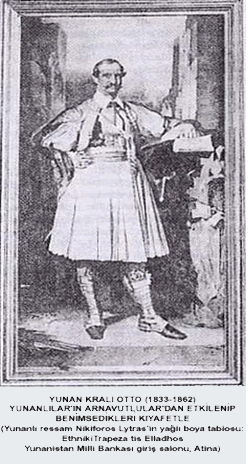
The Albanians in the first 2 groups have been subject to exile or ethnic cleansing or assimilation at different times by the Greek state. The Greek administration does not acknowledge their ethnic identity and existence and claim that those especially belonging to the Orthodox branch of Christianity are “Hellenist”. Although there are those who define themselves Greek in this group qualified as “Arvanites”, the underlying reason for this situation is the Greek policy based on assimilation.
According to the findings of Hugh Poulton, an expert on the Balkans, a crowded Albanian population existed in Attika, Boeotika, south Evvoia and Hidra, and even in the Plaka district of Athens up to three generations before. Plaka was known to be the Albanian district of Athens, their own courts existed there and the transactions were conducted in Albanian. This situation continued until 1940’s, and after the claims made by the Greeks during the World War II and the Greek civil war that “Albanians cooperated with the occupying Italians”, the Albanians in the country were either deported, or massacred or were exiled to the various regions of Greece. The language of the Arvanites which stayed in Greece is faced with the danger of extinction as a result of the Greek national Orthodox church and the assimilatory education system education system and the social pressure. According to the data of the European Bureau of Lesser Used Languages, Albanian is spoken in the disconnected regions far away from each other in the central and southern regions of Greece. However, this is only possible in private life, inside the house. The fact that it is spoken openly within the society is reacted by the Greek public.
The other Albanian group living in Greece, Chamerian Albanaians have been the target of a comprehensive genocide. During the civil war, the EDES gangs under the command of General Napoleon Zervas comprising the anti-communist front was struggling against the communist EAM-ELLAS forces on the one hand, and conducting a mopping-up operation against the non-Greek elements such as Macedonians and Albanians on the other hand.
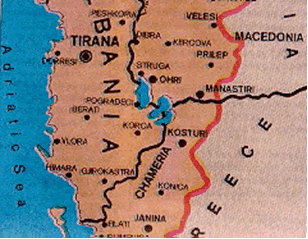
Before the Italian invasion when a mobilization was declared in Greece, the Chamerian Albanians, which were the Greek citizens, applied to the Greek government to express their wish to enlist and yet they were used as construction workers with pickaxe and shovel although they were registered within the scope of mobilization. The Greek administration feeling worried about this mistake they had made a short time ago during the Italian occupation exiled all the men aged 14 and above to concentration camps and treated them as wars of prisoners. The main great massacre against the Albanian public in Chamerean region was started to be committed on 27 June 1944. A genocide was conducted in which people were dismembered and the pregnant women as well as the babies were massacred.
Between 27 June 1944 and March 1945, Greeks massacred 3242 civilian people in Chameria as a whole of which 2900 were old or young men, 214 were women and 96 were children. Also 745 women were raped, 76 women were abducted, 32 babies below the age of 3 were massacred, 68 villages were completely destroyed, 5800 houses and worship buildings were demolished. After these atrocities, the surviving Chamerian Albanians had to leave their homeland. The survivors found themselves in a position of not using their own tongue in their own homeland as a result of the policy of Athens which denies the Albanian ethnic identity except the Orthodox identity. The properties and possessions of the Albanians who were deported or ran away were distributed to the settlers brought to the region and all the place names in the region were translated into Greek.
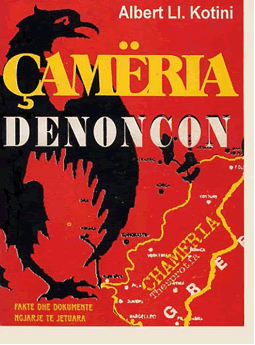
Today the Chamerian Albanians continue their struggle for their rights through the Chamerian Political Patriots Association located in Tirana. The Albanian People’s Council approved and declared 27 June as the commemoration day for the Chamerian genocide with the decree passed 30 June 1994.
The Chamerian issue was dealt with in the 4th general assembly meeting of the Organization for the Unrepresented Nations and Peoples in January 1995 and as Decree 12 the following points were emphasized.
• Returning of the Chamerian people to their homeland and returning of their rights,
• Granting the right of returning their possessions to the Chamerian people,
• Granting the rights resulting from the international agreements and documents, an to this effect acknowledging the historical facts of the Chamerian issue and taking serious steps by the Greek government. Especially with the efforts of the Chamerian Political Patriotic Association, the issue of “Chamerian genocide” has been discussed in the international platforms in such a way that some results have been obtained: According to this;
• In the special session held on 20.08.2002 by the U.S. Senate, Cham issue was discussed and the Albanian press carried that the U.S. Senate turned on the green light for the solution, that an international ground was created with the US handling the issue of Cham which is an important subject and the first victory was won, and that the statements made by the Representative of Greece in reply were not considered satisfactory.
• International Radical Party on the advisory status in the UN has taken the decision that Chamerian issue would be submitted to the European Union Parliament and required the Greek Government to respect the rights of Chamerian people in accordance with the agreement on human rights. One of the deputies in the EU Parliament of the Radical Party, Ema Bonino stated that they signed a motion together with 6 EU deputies in order to ensure the issue to be discussed in the EU Parliament.
• In the UK, the Royal Military Academy Sandhurst and the Center for Investigation and Inquiry of Discrepancy has the book entitled “Chamarian Issue” published.
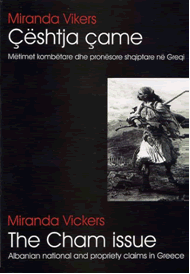
The immigrant Albanians comprising the third group include those who came to Greece especially after cold war which is assessed to be an appropriate place to find a job as it is EU member. At the moment there are almost 300.000 Albanian immigrants in Greece, which has a high potential for illegal immigration, and it has been the Albanians which have been affected the most by the measures against he immigrants taken by the Greek administration. For example, while 200.000 illegal immigrants were deported in 1992, 150.000 of them were Albanians.
The smear campaigns conducted against the Albanian immigrants in the Greek press have resulted in the emergence of animosity against Albanians called Albanophobia in the Greek society.
As they are illegal immigrants, the Greek people have abused this weakness of theirs and there have been Greek people who have employed the Albanians at a very low wages, who have not paid for the work they conducted and who have threatened to notify the police if they claim for their rights.
The practices against the Albanian immigrants in Greece are always on the agenda of the annual reports of the human rights organizations. In the press release on 27 March 1998, it is stated that the mayor of Palio Keramidi in Pieria banned the Albanian immigrants to go out after the sunset and this has been a decision violating the human rights as well as a racial one. In the same press release it is mentioned that the members of the organization established by the name of “Committee for the Robbery Victims” in Ikaria wearing the dresses similar to Ku-Klux-Klan organization in the USA have attacked the innocent Albanians. One of the examples included in the reports is that in 1995 an employer in the Crete killed his two Albanian immigrant employee in order to pay their wages.
All the Albanians working in Greece whether legally or illegally are viewed with prejudice and considered as criminals and they have a disorderly life as they have no social security and their children have no opportunities for education - training.
It appears that the Albanians in Greece whether they are the Chams remained in the region surviving the genocide, whether they have been artificially categorized as Orthodox-Arvanites or whether they are the immigrants who are the Albanian citizens will continue to be the victims of the systematic discrimination and assimilation policies in this country as long as the irrational calumnies of the “albanophobia” which is a shame of humanity exist.
Macedonian Minority
A community defining itself as of Macedonian origin and defending that they have different ethnical origin from the other Greek citizens, and therefore they constitute a minority exists in the region surrounded by the Pindus Mountains, the Rhodope Mountains and the Aegean Sea. Greek government considers the word “Macedonian” as a geographical term defining all the Greek citizens living in the North of Greece, rejects the claims that the minority of Macedonians exists in Greece and defines this minority group as the “Slavic-Greeks” or “bilinguals”. Since the first invasion movements, Indo-Germans, Celts, Illyrians, Thracians, Dacians, Dorians, Akas, Avars, Kuman-Kipchaks, Mikens, Bulgarians, Slavics, Romans influenced this land either through temporary invasions or permanent occupations; various tribes reigned through different administrations. A small tribe called Macedonian established an administration around the River Bisritsa under the leadership of Perdikas I. at the beginning of 1000 B.C..
During the long history of Macedonia, from 7th century BC to 10th century BC, the Macedonian Kingdom (Philip II, Alexander the Great), the Roman Empire, the Eastern Roman (Byzantine) Empire, Bulgarian and Serbian Kingdoms and Ottoman Empire ruled over this region.
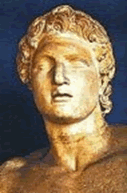
The Balkan Wars of 1912-1913 were one of the significant milestones in the Macedonian history. While Serbia annexed “Vardar Macedonia”, Bulgaria annexed “Pirin Macedonia”, Greece seized “Aegean Macedonia” covering an area of 33.953 square kilometers and having a population of more than one million and it began to repress and “non-nationalize” the Aegean Macedonians through the intensive policy of assimilation and ethnic cleansing which has lasted up to now.
With the Law 352 of 1926, Greece initiated a large- scale campaign to “Hellenize” all the place names in Aegean Macedonia and the names of Macedonian families. In addition to the place names included in the copies number 322 and 324 on 21 and 23 November 1926 of the Gazette it was made obligatory to change the family names to the names with the suffixes “os”, “is” or “pulos”.
On the other hand, all the Macedonian names, symbols were removed from the churches, monuments, archeological pieces and graveyards, all the religious and literary work in Slavic-Macedonian were seized and burnt. Speaking in Macedonian was strictly forbidden, it was not even allowed to use in wedding and religious ceremonies and the Macedonians were sent to the obligatory language courses in Greek. Those who spoke in Macedonian were subject to repressions, they were sent to the prisons or concentration camps and yet this policy has caused their national conscious to be strengthened more.
In consequence of the civil war in Greece during and after the World War II, the massacres against Aegean Macedonians increased, 16 thousand people were killed in the west of Aegean Macedonia, 440 women and girls were raped, 120 thousand people were tortured in the concentration camps, hundreds of people went mad in consequenc e of the tortures, arson attacks were carried out against 1291 houses, 80 villages were plundered and thousands of people had to leave their homes. These pressures caused a significant number of Aegean Macedonians to immigrate overseas especially the USA and Australia. With the Law 3958 of 1959 the lands of those who were “not Greek by birth” and left Greece and did not return to the country for five years were confiscated and it was Aegean Macedonians who were affected by this law most.
All these pressures caused Aegean Macedonians inside and outside of Greece to unite further and to establish associations in order to protect and maintain their national existence. The non-governmental organizations such as Macedonian Human Rights Central Organization Committee, Humanitarian and National Rights Movement for the Macedonians of Aegean Macedonians, Macedonian Human Rights Center which were established in 1980’s within the boundaries of Greece and yet not considered as legal by the Greek administration began work to fight against any pressure applied against Macedonians in Greece and to struggle to use their mother tongue Macedonian in education, churches and every field of live and to improve the language.
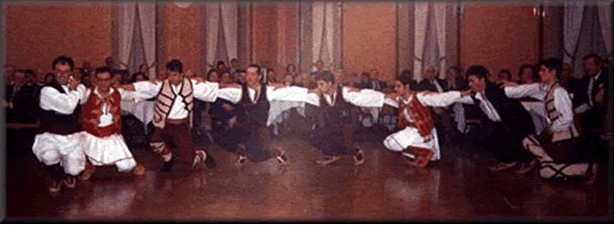
In fact, all the Slavic-Macedonian formations - whether they are legal or illegal (the establishments of which are not approved by the Greek Government) living in Aegean Macedonia are basically legal. For the members of the Macedonian minority living in Greece are the citizens of this country and Greece is in the position of a state which has made commitments on minority rights and human rights by signing many international documents and especially as a member of the European Union by making a series of commitments and yet not fulfilling any of them.
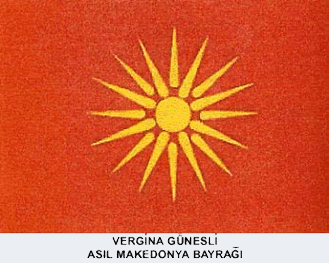
Being very good at assuming the non-existence of international practices, Greece has claimed “the Alexander the Great of Macedonia” and hasn’t acknowledged the name, the constitution and the flag of the Macedonian Republic with its sixteen-pointed star of Vergina on the red ground after it declared independence in 1991 in consequence of the collapse of Yugoslavia. However, as a result of the severe economic ambargos imposed by Greece, Macedonia had to change certain items in her flag and constitution.
Feeling uneasy about the new Macedonian government due to the Macedonian ethnic minority in its land, Greece, as the first job, declared the diplomas received from the University of Kiril I Metodi in Skopje null and void on the grounds that the language of instruction in this university was Macedonian and there was no such a language as Macedonian.
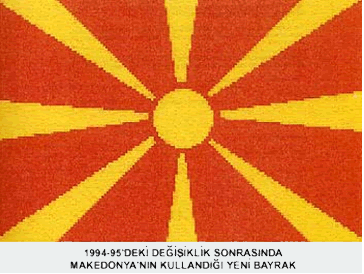
On the other hand, because Greece had not obtained the expected support either from the European public opinion or the USA despite all its attempts; on the contrary because an atmosphere favoring Macedonia and disfavoring Greece has occurred, Greece started to prevent all the commercial activities except the shipment of materials of urgent need in addition to its efforts to prevent the shipment of goods and oil which it had started to apply against this country. It applied a strict embargo against Macedonia especially concerning Thessaloniki-Skopje railway between 1994-1995. This resulted in the occurrence of serious problems in the Macedonian economy.
Despite being a party to significant international agreements on human rights Greece conducts practices against the minorities in the country, which are not overlooked and which are displayed in many reports issued up to now. In the human rights reports issued by the USA in 1990 and the following years Greece has been criticized decisively for the discriminative and oppressive policies it has applied against the Macedonian and Turkish minorities and similar expressions are also included in the annual reports of the many international organizations such as Amnesty International and Helsinki Watch, etc
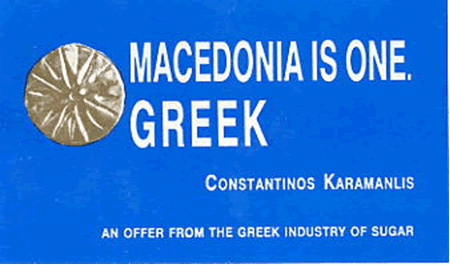
The writing with the expression "Macedonia is one unit, it is Greek" which was printed by Greek sugar factories, shows very obviously how Greece brings up the fact, that it has hopes of Macedonia, in every occasion.
The Macedonian human rights promoters in Greece are always monitored and subject to repression as well. Of these, the prominent ones who are involved in the events drawing attention of the international community compared to other activists are Hristos Sidiripulos, Tasos Bulis, Nikodimos Tsarknias, Petros Dimitsis, Stavros Anastasiadis, Konstantinos Gotsis, Stavros Sovislis. The judicial and administrative pressures those people have been subject to and the physical damages inflicted by the security forces have been reported by many organizations and announced to the international public opinion.
One of the Macedonian human rights advocates Sidiripulos, stating that immediately after the occupation of the Aegean Macedonia in 1913, in order to frighten the Macedonian public and to prevent the children from attending the Macedonian schools, his grandfather was hanged by the tongue by the Greeks and his father was tortured severely on the grounds that he collaborated with the communists during the Greek civil war, was convicted for intending to establish “Macedonian Culture Center” which he tried to realize for keeping alive the Macedonian language and the culture in 1990 for the first time and for using the statement that “there is Macedonian minority in Greece” in the OSCE Humanitarian Dimension Meeting held in Copenhagen in June 1990. In a report-commentary carried in the Times on 22 August 1994 it was stated “Sidiripulos should be granted asylum by the UK vis-à-vis the repression deemed proper for him.”
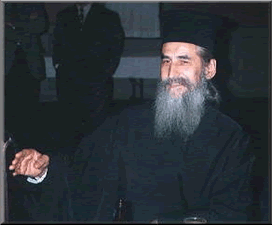
One of the Macedonian human rights defendants, Nikodimos Tsarknias the priest was subject to great repression and physical manhandling, spent years in courts and he was discharged from the priesthood in consequence of defamation although he only requested the essential rights of speaking in Macedonian, conducting their religious ceremonies in their mother tongue, singing their national songs and had no request or made statement that Aegean Macedonia should separate from Greece. Such practices against Tsarknias being physical attack in character were proved with health reports and they were included in the agenda of the human rights organizations.
Almost 30.000 children at the ages of 2 – 14 who were taken outside of the country by the Red Cross for protection in 1947-48 are around 50’s at the moment and they have not been able to return their homeland in Greece. Those people who are not even allowed to enter and short-term stay in Greece have become organized among them and established an association called “The Association of Refugee Children from Aegean Macedonia”.
In 1998 the members of this association planned to have a gathering and commemoration in order to see and visit the places they were born on the 50th anniversary of 1948; however, as they knew the attitude of the Greece they got in touch with International Helsinki Federation of Human Rights and required assistance. Yet, these people were not allowed into the country despite the fact that this organization got in touch with the Greek deputy minister of Foreign Affairs Yorgo Papandreu of the time, requested his assistance and received a positive answer. This situation brings to mind the question of to what extent and how the Greek bureaucracy and the statesmen can be trusted.
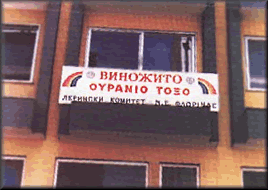
Greece does not grant any rights to Aegean Macedonians with regards to political activities. The Macedonian minority party called “Vinojito” established in Lerin (Florina) on 6 September 1995 was reacted immediately; the party building was attacked with stones and clubs in consequence of the provocation of the Mayor of Florina and its signboard was taken down.
The party founders Vasilis Romas, Kostas Tasopulos, Petros Vaisilidis and Pavlos Vaskopulos were tried for “they used their mother tongue openly”, in the trial held 15 September 1998 the Vinojito Party was acquitted in presence of the representatives of the international organizations participated on the announcements and invitations of Macedonians.
A political organization called “the Macedonian Movement for the Welfare of the Balkans” established in Sobotsko (Aridea) in 1989 is also included in the struggle of the Macedonian minority for their rights in Greece. Although this movement participated in the elections of the European Parliament held in Greece in 1994 jointly with the Vinojito, it was able to receive only 7.263 votes in consequence of the obstructions and the various measures taken through administrative and legal means by the Greek authorities.
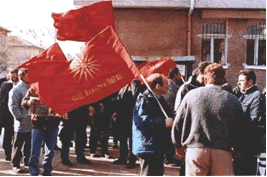
As the legal process on “the Macedonian Cultural Center” (Macedonian Civilization House)” which the Macedonian minority intended to establish in 1990 but which was not opened with the decree of the regional court of Florina (Lerin) was completed in Greece and no permission was given, the founders took up the subject to the European Court of Human Rights in Strasburg. The trial process, which began on 24 March 1998, was finalized on 10 June 1998. European Court of Human Rights sentenced Greece in accordance with the Article 11 of the European Convention and the decisions taken in the OSCE Humanitarian Dimension Meeting held in Copenhagen. Unfortunately, Athens administration, in an illegal way, still resists not give permission for the opening of this center.
It is possible to see the mentioned practices of the Greek Administration violating the Aegean Macedonians’ human rights in the annual reports of all the human rights organizations and it is wished for Greece, an EU country, to give up considering all the minorities living on its territories as an ethnic danger and to start treating them at least in accordance with the due citizenship rights.
Wallachian Minority
The Wallachians, which are among the local elements of the Balkan Peninsula and one of the oldest communities of the region are one of the non-Greek minorities living in Greece. The Wallachians is a Macedonian-Romanian speaking community of Latin origin which settled in the Balkans at very early times having a population of 2.500.000 scattered to various countries. Although the Wallachians call themselves as Romani, Romeni, Aromani, they are defined by the Greeks as Helens speaking a certain dialect or Kutsovlakh, or even Latinized Helens in times of Roman Empire. According to the Wallachian Diaspora sources, the number of Wallachians living in Greece may be 250.000 – 1.200.000. Evangelos Averof of Wallachian origin, one of the former Greek foreign and defense ministers stated that this number was 150-200.000 as of 1948. In Greek 2 different Wallachian languages are used, one being the Megleno-Romanian and the other being Wallachian. The group speaking Megleno-Romanian are called Vlasi and this group is the Latinized branch of Pechenek and Kipchak Turks according to Winnifrith known for the Wallachian studies.
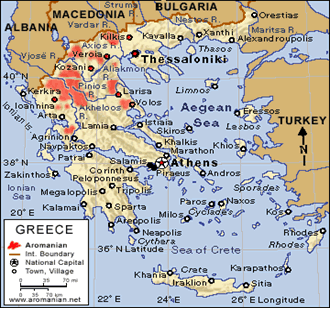
The Wallachian minority living mainly in the mountainous regions and the regions of valley in Greece is a community dealing with herd shepherdness, farming and trade. The Wallachians live in the Pindus mountains and its vicinity in Greece, Thessalia, the western and northern regions of the Aegean Macedonia, Vermion Mountain and its vicinity and the region of Meglen in the north of Thessaloniki.
According to Wace and Thompson known for their research on Wallachians, they come from the same origin as the Romanians. Also, the fact that the Wallachians have a nomadic – shepherding life, a feature established by all researchers, does not allow they have any kind of connection with Greeks from socio-cultural and anthropological respects which claim persistently that they have had a settled civilized structure for centuries. Even Richard Clogg who is known for a Greek sympathizer state that the Wallachians speak a language similar to Romanian and they are an important minority in Greece today.
One of the most important turning points for the Wallachians has been their recognition as a ‘millet’ by the Ottoman State in 1905.
The most important turning point in the history of Wallachians is the acknowledgement In consequence of the educational activities conducted by Margarit the Wallachian priest born in the Pindus region, an intensive conscious raising movement occurred among the Wallachians in the second half of XIX century. The education given by Margarit to Wallachian youth, the fact that he taught the language of Wallachian to them and the Romanian schools opened up in the region over time activated the Greek Orthodox Patriarchate and as a result, the Patriarchate which had established an indisputable hegemony over all the Balkan Orthodox people for centuries felt very uneasy about this development and reacted against it. As a result Margarit went to Bucharest and joined the Macedonian – Romanian Committee. However, these developments were taking place during the rule of the Ottoman Empire in the region. Within this framework, 6 Wallachian representatives and 2 priests who came to Istanbul in 1892 complained about the activities and the pressures of the Patriarchate against them and requested help. As a result, the Ottoman administration made it possible for Wallachians to establish their own churches and to hold their religious ceremonies in their own language. The Greeks felt uneasy about these developments and they threatened the Wallachian priests with gangs. In February- March 1905, the Greeks attacked the Wallachians living in the villager of Florina-Nikhovan and murdered 6 people.
Acknowleged by the Ottoman State in 1905, the Wallachians had a short but a new period in which they had equal rights officially for the first time; thus, they were able to elect their own administrators, have their own churches and schools and send representatives to the Ottoman Parliament. In the process up to the Balkan Wars, the Wallachian deputies were present in the Ottoman Parliament and worked with the deputies of other “nations”.
With the mentioned granted rights, the number of the Wallachian primary schools in the region until 1912 increased to 114, high schools to 4 and they published almost 20 journals-newspapers in their own language.
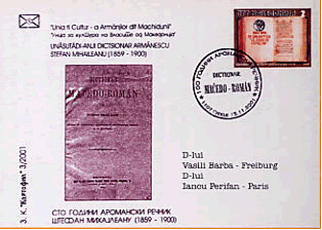
The national anthome lyrics written by Wallachians national poet Konstantin Belematse, after being recognised as a nation by Sultan Abdulhamit II, is still alive.
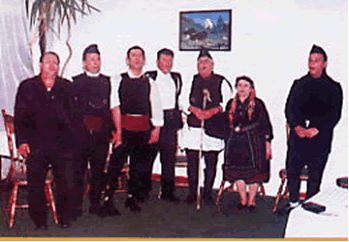
The Balkan Wars of 1912-1913 affected the Wallachians in a negative way as it affected all the minorities living on the territories of the Ottoman state in which it lost its dominance. With the 1913 Bucharest Agreement Greece acknowledged the Wallachians in the Aegean Macedonia coming under its own rule and allowed their schools and churches at first, however, it also took precautions limiting the use of their language in the public places in order to destroy the national conscious among the Wallachians.
In the period between two wars, especially during the dictatorship of Metaxas, in consequence of the state terrorism applied in Greece, the Wallachians were pressurized to learn Greek like the Macedonians and those who attended the Wallachian schools were discriminated against those attending the Greek schools.
The second turning point in the history of Wallachian history is the period of “Pindus Princedom”. During the World War II in Greece which is under the occupation of Italy, the establishment of “Pindus Princedoom” under the Italian guidance and the leadership of Alkibiades Diamandi which is intended to be won from Wallachians for “fascist cause” was made possible. Diamandi who was declared as the prince for this formation that is autonomous was at the same time leading the military force known as “Roman Legion” and the Princedoom included Epirus as well as the whole of Thessalia. However in consequence of the defeat of Italy this attempt ended in failure
Some of the Wallachians considering themselves separate and different from the Greeks accepted the assimilation policy applied by the Greek State to a certain extent. They were even assimilated, however, those who displayed stiffer attitude left Greece and immigrated to the overseas countries such as the USA and Australia and they formed a Wallachian Diaspora.
The national conscious of the Wallachians immigrated to the USA, Australia and Western European countries is stronger and they have maintained their relations through the associations they have established. “the Farsarotul Assocciation” in the USA, the Wallachian Language and Cultural Union established in Germany/Freiburg lead by Vasile BARBA can be given as examples. On the other hand, with the initiatives of BARBA, the professorships of Romanistic of Mannheim and Freiburg universities made a protocol and realization of the “International Aromence Profesorship” in August 1986. There are almost 3000 Wallachians in Germany and they try to maintain their language and identity through the Center for Wallachian Language and Cultural Union and Wallachian Studies.
On the other hand, in 1998 the European charter of Regional and Minority Languages which was also signed by Greece and put into practice by the European Council Balkans Committee in 1998 introduce a protection including the language of Wallachian. Although the initiative called European Bureau of Lesser Used Languages (EBLUL) stipulating the protection and survival of the lesser used languages in Europe is supported by the European Union, the EU member Greece is reacted.
However although the Greek propaganda finding a solution for every problem has the Wallachian associations established under its own guidance conduct activities and try to give the image that the Wallachians maintain their cultural existence, the fact that they are conducted in Greek indicate clearly that the so-called scenarios are performed.
The Greek officials, overlooking the activities of the so-called associations established for their own purposes, was not tolerant for the Wallachian minority leader called Sotiris Bletsas trying to distribute a map prepared by EBLUL in 1995 and illustrating the “Lesser Used Languages in Europe”. Bletsas was manhandled by the police for his act, he was sentenced to 15 month imprisonment and a fine for 500.000 Drachma. P. Dimitras, the Spokesman for the Greek Helsinki Monitor who was closely interested in the subject was attacked physically by a YDP deputy in a television program. After the event of Bletsas who was arrested for distributing the map prepared by the EBLUL supported by the EU, a Western diplomat felt the need to say that “Let’s see when they will arrest the EU.”
In consequence of the fact that one of the leaders of the Wallachian Diaspora in Germany BARBA’s requesting support from the Romanian Parliament in 1994 and the reports submitted to the European Council, the European Council started to deal with the Wallachian issue since 1996. As a result, the European Council approved the report submitted by the Spanish deputy Luis Maria de Puig on 24 June 1997 unanimously.
Such an issue which are on the various agendas of the various platforms of the European Union indicate how Greece acts contrary to the establishment, functioning and maintenance principles of the European Union. And yet, however much Greece insists to deny, it seems that the struggle of the Wallachians, one of the oldest communities of the Balkans as well as Greece, whose history goes back to 2000 years ago for their rights and for the maintenance of their culture will continue.
|
SULTAN ABDUL HAMID II MARCH |
IMNUL SULTANLUI ABDUL HAMID O! |
Jewish Minority
Antisemitism in Greece
Greek antisemitism until the independence of Greece
The land where Jews lived for the first time in history is the territory where today's State of Israel and the Palestinian Autonomous Authority are established. Historian Solomon Grayzel says Jews have resisted the Babylonian and Persian attacks for years, suffered great damage from them, forced to emigrate from their homes, but they did not lose their selves. According to Grayzel, after the Babylonians and Persians, the Jews met the Greeks which will be their new adversary, and that will fight for centuries.
The first interactions between Greeks and Jews began when Jews migrated heavily to Greek urban states in order to find better trade opportunities.
In the process of Greece gaining independence from the Ottoman Empire, Jews along with Muslims have been targeted by attacks by Greek insurgents. In such incidents, which occurred in the second half of the 17th century, Greek rebels carried out systematic attacks against the Muslim and Jewish populations. As a result of these actions, the Jews of Chalkis, Thebes and Navpaktos were completely destroyed.
With the start of the Greek uprising, there has been a significant increase in attacks on Muslims and Jews. In September 1821, the Greeks attacked the town of Tripolitza in Mora, completely burned down the city of 30,000, including around 8,000 Jews, and less than a third of the city's residents survived the massacre. During the attack, Muslims and Jews were killed by the Greeks without any discrimination.
The Tripolitza massacre is a continuation of such actions that began in the Spring of 1821 in Wallachia and Moldavia. The Greeks living in this region, along with the Wallachians, massacred hundreds of Jews and Muslims. The number of Jews killed in Tripolitza is 1,200. Looking at the entire Mora peninsula, this number climbs to 5,000. British John Hartley, who witnessed the Tripolitza massacre, said the massacre was ‘Jewish blood mixed with Turkish blood flowed through the streets of the occupied city. The sons of Isaac and sons of Ismail shared the same fate (...) ‘.
All the regions where the uprising spread were the scene of the same purification policy, while Muslims and Jews who could save their lives were either forced to migrate to Ottoman territory or became enslaved workers in areas dominated by the Greeks.. François Pouqueville, a French writer who was in the region at the time of the uprising, writes in his 1825 book ‘Histoire de la Regeneration de la Grèce’, his observations about the Greek attitude towards Muslims and Jews:
‘The Greeks who surrounded Varhori wanted the Turks and the Jews who helped them to surrender and they declared that their lives would be spared if they followed this order. The Turks and Jews surrendered. Those who adhere to the religion of Moses and Muhammad were imprisoned together. The prisoners were covered with cotton cone. They were en masse transported to the island of Anatoliko. They were forced to work extremely hard in this island’.
During the uprising, Jews in some areas were completely destroyed. For example, Jewish communities on the islands of Sparta, Patras, Corintos, Mistra and Argos were eliminated by Greek rebels. The survivors fled to the Ionian islands, mainly Corfu, under British rule.
After the end of the Greek uprising and the establishment of the Kingdom of Greece, where Prince Otto I of Bavaria was crowned as king, the Jews were unable to escape the attacks of the Greeks. One of the most striking of their attacks against Jews was the Pacifico case of 1847.
Traditionally, the Greeks made a puppet of Judas, whom they called "Jew", during the Orthodox Easter Feast, walking it around the streets, while the puppet was stoned by the public and then cremated. During this incident, there were also attacks on Jews and Jewish neighbourhoods from time to time. Before Easter 1847, the Greek Government cancelled this puppet walking ceremony, as the Jewish-born Englishman Baron Rothschild would visit Athens for a loan issue. The people then stirred up and attacked the house of David Pacifico, one of the Sephardic Jews in Athens. Pacifico, a British citizen, barely saved his life from the attack and took refuge in the British Consulate. The British Government has repeatedly asked for compensation for the damage done to Pacifico's property. Finally, in 1850, when the British navy blockaded the port of Piraeus, the Greek Government agreed to pay compensation to the damaged Jew.
During the Pacifico incident, the Jews of Athens were not killed, but Jews living on the Ionian islands annexed by Greece in 1864 were not as lucky as their coreligionists living in Athens. There were around 2,000 Italian-speaking Jews living in Corfu and several hundred on the island of Zante. Ionian Jews, who failed to exercise civil rights such as voting and public office in 1815-1864, were granted their rights during the liberal rule of King George I of Denmark. However, the king's soft attitude towards Jews provoked a backlash on the Ionian islands, especially among Orthodox Greeks living in Corfu. Historical antisemitism, which already exists in Greek society, has risen again on these islands since 1870. The newspapers Peripaiktis, Kodan and Rigas O Feraios, owned by a politician named Yakovos Polylas, began to include articles attacking the Jewish community of Corfu island.
On 2 April 1891, the body of a young Jewish girl named Roubina Sardines was found near Corfu synagogue. Polylas's newspapers immediately began spreading the rumour that she was actually a Christian and that Jews killed her to use her blood in rituals. As such, Orthodox Greeks attacked Jewish neighbourhoods and Jews. Several Jews were killed in the Easter-long attacks. The government only intervened a month after it began. Before the events, the Jewish community in Zante, which consisted of 271 people, had 30 left. There was a heavy exodus from Corfu and Zante to the Ottoman Empire and western European countries. In the events of 1891, Ionia was largely cleared from Jews.
In 1897, during the uprising started by the Greeks on the island of Crete, several hundred Jews living in the cities of Chania and Heraklion were forced to migrate to Ottoman territory. The Ottoman administration, as it has done for centuries, accepted these people who were subjected to fanatical attacks with great dignity and placed them in Izmir.
The situation of Jews in Larissa, Trikala, Volos and other parts of Greece was also not very good. Jews, who have frequently been subjected to blood slanders and accused of collaborating with the Turks, have systematically been removed from the land where they have lived in for centuries. Jewish merchants, who made a living carrying goods between the cities, were forced to quit their jobs due to attacks by Greek gangs. With the Balkan War, Greece's policy towards Jews has entered a new phase. After Greece invaded Thessaloniki, Chios, Crete, Chania, Kavala and Florina, the Jewish population in Greece, which was 10,000, rose to 100,000.
Just four years before the Balkan War, a Greek delegation commissioned to bring Megali Idea to life in 1908 and visited Thessalonik,i investigated the economic and social structure of the city and outlined the policy to follow on the part of Greece with respect to a possible Greek occupation. According to the report prepared by the delegation, the Greeks had little say in the economic life of Thessaloniki. Reversing this situation and making Greeks the true judges of the city were essential to Greece's interests. Thessaloniki should have ceased to be a Turkish and Jewish city. After the drafting of this report, the Greek authorities began to reverse this situation and make efforts to dominate the city. For this purpose, some Greek banks were established in Thessaloniki during that period. Propaganda has been stepped up to prevent agricultural products grown by Greek farmers from being sold to Jewish brokers.
The Harostis newspaper of Thessaloniki, published articles by the Greeks of Thessaloniki, indicating that Greeks should start an economic war against Jews. Jews, on the other hand, formed a union called club des Intimes to counter this Greek-led campaign. Turkish rulers of the city have banned publications targeting Jews in Greek newspapers, citing fears that this tension between the two communities could result in a conflict. Nevertheless, tensions between the two congregations continued in the period up to the Greek invasion of Thessaloniki in 1912.
The Greeks were not hiding in any way that they were looking for the opportunity to take over Thessaloniki. Such an opportunity came to light in 1912. With the outbreak of the Balkan War, the atmosphere of peace and security in Balkan countries was eliminated, replacing it with racial nationalism and religious intolerance. The congregation that suffered the most from this environment was the Thessaloniki Jews. In the immediate aftermath of Greek occupation, the Greeks, who made up a third of the population of Thessaloniki, engaged in violent acts against Jews and Turks.
On 27 October 1912, when the Greek army began to take over the outskirts of Thessaloniki, Embros, a local Greek newspaper, published a report that some Greek soldiers had been poisoned by what they ate, and that it was the result of a conspiracy by the Jews. This news, which was published without even any investigations yet, was enough for the Greeks to act against the Jews.
The main events began after the Greek army completely took over the city. Immediately after, Tahsin Pasha, the Turkish commander of the city of Thessaloniki, surrendered on 9 November 1912, and the first Greek troops and then the Bulgarian army entered the city. The local Greeks, who took this as an opportunity, began attacking Turkish and Jewish neighbourhoods by demonstrating a great example of fanaticism. While one would have expected Greek troops to prevent the attacks, most of the time they had actually assisted the fanatical Greeks in their actions. The events were a complete pogrom. More than 50 women have been raped. 400 Jewish shops and 300 houses were looted. Those who tried to resist looting were killed.
The pressures of the Greek army and local Greeks against Turks and Jews reached such great heights that many of the leading European newspapers of the period have published news and articles on the issue, urging European governments to stop the massacres. Britain's Times newspaper wrote:
"Turks and Jews are stopped on every street and subjected to top-to-bottom searches from head to toe. Watches, bags and whatever they have of valuables are being usurped. The slightest resistance is squashed. Greek officers don't even bother to raise their hands to stop the attackers in the face of these incidents they are witnesses to. The Local Greek press is conducting publications targeting Jews and provoking the community. As a result, the goods of the unfortunate Jews are looted, and they are mistreated. In Thessaloniki, 75,000 Jews live, accounting for about half the population. This puts the city in a different position between the eastern Mediterranean port cities, where the Greek population is often dominant. The Jews have always been loyal Ottoman citizens and have always experienced full religious freedom."
France's Le Temps newspaper reflected a similar view:
"Many Jews were mistreated and their belongings were confiscated in particular. Shops were looted, synagogues were damaged."
The newspaper, which closely followed the Thessaloniki events and reflected it in full detail, was The Jewish Chronicle, published by British Jews in London. This newspaper regularly reports from the beginning of 1913 reflected the following landscape:
"Looting, extortion and similar acts against Jews are continuing in Thessaloniki. Greek military authorities are not attempting to stop them." (3 January 1913)
"The whole Jewish community came together at the funeral of two martyrs who lost their lives during the Greek looting movement. During the ceremony, the vast majority of all Greek shops and Muslim shops were shuttered. An enormous cortege of 12,000 people has been created. Greek authorities have barricaded themselves in front of the cortege. The gendarmes under Captain Axialos filled their weapons and asked them to leave the cortege. However, they did not succeed." (10 January 1913)
"Since the occupation of the city by the Greeks, there have been significant changes in the lives of the proud Jewish community. They have met with the great catastrophe and evil fate of the Jews of Russia and Romania." (24 January 1913)
"In the heart of the Greeks, a deep sense of hatred and jealousy has been established against the Jews. We have to put up with the sad consequences of these feelings." (24 November 1913)
"Thessaloniki's once prosperous Jewish neighbourhoods have taken on the image of a complete ruin. The mass exodus of Jews from the city continues. There's not a single glimmer of hope. All suspicions about how this situation occurred are focused on the city's new masters." (29 May 1914).
"The Greek press campaign targeting Jews continues unabated." (17 July 1914)
The events during the occupation also provoked international reactions from Jewish communities in other countries. A committee co-founded by the Anglo-Jewish Association and German Hilfverein, consisting of Paul Nathan, Elkan Adler and Bernard Kahn, arrived in the area in January 1913 to determine the situation in which the Jews were in place. In its report, the committee said the situation in Greek-occupied territories, particularly Thessaloniki, was much worse than in Serb and Bulgarian-controlled regions.
In addition, the American Jewish Committee, headed by Lois Marshall, demanded that the U.S. Government intervene to protect the rights of Jews on lost Turkish soil after the occupation, while in a letter to the US Secretary of State Knox, the international head of B'nai B'rith Adolf Kraus called for Athens to protest over their persecution in Thessaloniki.
In the wake of the occupation, the attitude of the Greek press towards Jews became increasingly hardened. There were reports in the press that repeatedly accused Jews of cooperating with the Turks and being traitors. The antisemitic attitude of the Greek newspaper in particular is remarkable. Embros blamed the Jews, saying the Jews did not welcome the Greek army's entry into Thessaloniki and did not hang a Greek flag in their homes.
The intense pressure of the Greeks against Jews was in the world press, with some major states, particularly Britain and France, attempting to end the situation with the Greek Government. In addition, foreign consulates in the city were very disturbed by this situation and had to inform the Greek Government that if order was not restored within twenty-four hours in the city, they would provide it with their own military units. This ultimatum worried the Greeks.
Realizing that the reactions towards them were getting bigger, the Greeks had to soften their attitude, albeit apparently. The Government of Venizelos immediately made statements and took a series of measures against acts against Jews. Prisoners of war and Jews held in prisons for no reason were released.
The Greek Government, which has been forced to take measures due to international pressures, managed to eliminate concerns that increased violence will continue in the period following the occupation. Indeed, the request of the Jews of Thessaloniki to represent themselves internationally by interfering with the central Zionist Committee's situation was withdrawn as a result of the Greek Government's position. During the Balkan War and World War I, the Thessaloniki Jewish community had the opportunity to test the credibility of the Government of Venizelos and found that under those circumstances they had no better choice than living under the Greek government.
Between 1912 and 1919, Greece pursued a soft policy towards Jews, trying to win the Jews who dominated the social, economic, cultural and industrial life of Thessaloniki. 70,000-75,000 Jews who lived in and around Thessaloniki were contributing to the social, economic and political dynamics of this region. Thessaloniki Jews, who did not initially reject Greece's so-called compromise hand, eventually realized that such integration would be against them. Greece's dominance of Thessaloniki meant that the relationship of Jews with the Balkans was severed. On the other hand, such a situation meant the systematic Hellenization of Thessaloniki, thus excluding Jewish culture and existence.
By the time of the First World War, the most important development in Thessaloniki was the fire that broke out on 5 August 1917, and completely destroyed the city's Muslim and Jewish neighbourhoods within hours. 52,000 Jews and 11,000 Turkish homes and businesses were lost in the fire, which also destroyed the city's commercial centres. It was not clear how the fire broke out and how it spread so quickly.
In a commentary published in the New York Times two years after the fire, it said, "the government has never made a satisfactory statement. In a liberal-leaning daily newspaper in Athens, as news of the fire and the happiness of the destruction of Macedonia's ancient ghetto, the population of Thessaloniki naturally turned their suspicions in this direction."
Whatever the cause of the fire, post-fire developments show that the incident provided some advantages to the Greeks, not Jews. A week after the fire, the government nationalized all the damaged areas and prepared a plan for the reconstruction of the city. However, while new buildings were being built under this plan, Jews and Muslims who were left out of the fire did not have equal rights with the Greeks and were excluded from the new Thessaloniki. The work of The Jews, who wanted to build their neighbourhoods themselves, was deliberately slowed down by the government. All this has led to escalation of tensions between the Government and the Jews.
The Hellenization process, which accelerated with the invasion of Thessaloniki in the Balkan War, peaked with the 1917 fire. However, this process, which could have been fully concluded in the 1930s, led many Jews and Muslims to leave the city, leading to the migration to the Ottoman Empire and then to Turkey.
1919-1945 Period
With fascism rising in Italy and Germany, oppression and discrimination against Jews living in the Balkans began to increase. The antisemitic protests that soon spread across the Balkans also found supporters in Greece, one of the countries with the most striking examples of anti-Semitism in the region. The Hellenization policy, which was implemented since the seizure of Thessaloniki, where Jews live massively, was introduced in 1922, when the First World War ended, when Greece's "Asia Minor Expedition" was routed out and it gradually intensified.
The lives of the Greek Jews, which were already in unfavourable conditions, deteriorated even more as a result of the convention concerning the exchange of population between Turkey and Greece where many Greeks living in Turkey began to settle in Greece from 1923 onwards. This population was relocated in the neighbourhoods where the Turks had been living before and thus, they became neighbours with the Jews. The number of Greeks who came to Thessaloniki in this way was over 100,000, which upset the city's population distribution. Jews, who have had an uncompetitive superiority in the field of trade and crafts for centuries, began to decline in the face of new arrivals operating in the same areas with the support of the government.
The period when those from Anatolia were placed in and around Thessaloniki coincided with years when Greece tried to heal the wounds of the great defeat against the Turks. Those seeking excuses for failure began to vehemently blame Jews who were on the ranks of the Turks in the Anatolian resistance. Thessaloniki Jews also took their share of these accusations. The antisemitic campaigns, particularly initiated by newspapers called Macedonia and Tahidromos, led to a strained relationship between established Greeks, new migrants and Jews.
In this environment, the antisemitic rhetoric led by the Liberal Party, which ruled Greece from 1924 to 1936, made the lives of Greek Jews more and more difficult. Some of the decisions taken by the Greek Government resulted in the exclusion of Jews from economic life. The increase in the customs duty on goods brought from abroad restricted the possibility of Jews making cross-border trade. Jews, who are forbidden to work on holy Saturdays, were left out of the site by the regulation that envisages the establishment of markets on Saturdays. While the government issued import licenses, a policy of favouritism of Orthodox Greeks dealt another blow to the Jews. Finally, with the placement of sea transporters from Piraeus in Thessaloniki by the Government, Jews lost control of the Port of Thessaloniki, which they have held uninterrupted for 400 years.
After the breakdown of the economic power that formed the backbone of the Jewish community, the Greek Government began to target Jewish educational institutions. Several foreign educational institutions, mostly French schools, were closed to Jewish students. In addition, in elementary schools, education was prohibited in a language other than Greek. Jews who never used Greek in their daily lives were forced to speak Greek at the first stage, and in the long run they were condemned to forget Ladino or Hebrew which they were using in their daily lives.
In the political sphere, the Greek Government, led by Venizelos, put Thessaloniki Jews and Western Thrace Turks in separate constituencies, allowing minorities to gain political power, send representatives to parliament, and make an effective opposition.
Some benefited from Venizelos's antisemitic policy and put on a major demonstration on 29 June 1931 in a final blow to Thessaloniki Jews. The 2,000 Greeks who attended the demonstration began attacking Jews and their buildings, heading for the Kampbell neighbourhood, where 220 Jewish families resided in Thessaloniki. Hundreds of Jews were injured during the attack. However, the crowd, which aimed to completely eliminate the neighbourhood, set fire to several buildings, including synagogues, schools, community centres and the residence of rabbis. The fire soon burned hundreds of years of Jewish neighbourhood.
Greek police, who did not intervene until the fire began to fade on their own, were unable to catch the ringleaders who directed the incident and the anti-Semitic crowd. However, antisemitic actions in the region during the same period and the anti-Semitic leaflets they distributed were planned and carried out by Ethniki Enosis Ellas (National Helen Association), led by Kosmidis and Haritopoulos. Still, no member of this organization was captured.
The pogrom movement in Kampbell was neither the first nor the last attack that Greek Jews and Thessaloniki Jews in particular were subjected to. However, the systematic preparation, the swift execution and, most importantly, the unresponsiveness of State authorities during and after this action have given the Kampbell case a precursor to future events. Indeed, in July 1931, this time it was a synagogue which was torched in the Harilaos neighbourhood of Thessaloniki, followed by a Greek group attacking Sephardic Jews in neighbourhood n. 15. As a result of increasing antisemitic incidents and outcry from other countries, the Greek Government took a few ineffective measures like in 1913. Those who attacked Jewish neighbourhoods were brought to courts. However, the release of all of these people revealed how insincere the measures were.
The government increased the insincerity of the measures it took by confiscating letters sent by Jews living in Greece out of the country. In this way, the sheer dimension of the actions against Jews in the country were prevented from being reported to foreign public opinion.
In 1936, Venizelos was removed from power, and a new era began in Greece with the abolition of the Republic and restoration of the monarchy under King George. During prime minister Metaxas's dictatorship, Jews who were subjected to intense attacks during Venizelos' time were relatively relaxed. However, with the outbreak of World War II, another painful chapter in history opened for the Jews of Greece.
As developments emerged that would lead to World War II, fascists began to gain power in Greece, as in much of Europe. Jews were the first target of rising fascism. The period 1939-1941 was characterised by the oppression of local fascists on the Jews. However, the real negative developments for the Jews began when Greece was invaded by the Germans.
Immediately after they entered Thessaloniki, the first action of the Germans was to close all the newspapers that the Jews were publishing. Associations founded by pro-Republican Jews were disbanded. The 56,000 Thessaloniki Jews, three-quarters of all Greek Jews, were subjected to the atrocities of German soldiers and their Greek collaborators. Greece was led by Prime Minister Ioannis Rallis, a Nazi collaborator.
On 11 July 1942, General von Krenzki, commander of the German occupation armies in northern Greece, ordered all male Jews in Thessaloniki to gather in the city square. Jews were told that workers' cards would be handed out for their work. About 10,000 Jews were beaten by German soldiers until evening that day. The next day, they were sent to the swampy area to the west of the city. Most of them had malaria there.
In February 1943, when Nazi SS commanders took over German-occupied territories, Jews were sent to concentration camps. The Greek collaborators of the Nazis were very pleased with this situation. In particular, they welcomed that the areas vacated by the Jews were handed over to the Greeks by the Germans. The large Jewish cemetery in Thessaloniki was made available to the municipality of Thessaloniki under the pretext of expanding the university. Soon, the Greeks completely destroyed this cemetery. The tombstones were broken. Some were used as construction materials for houses. Even today, it is possible to see the Jewish tombstones from that period on the floors of the Agios Dimitrios church in Thessaloniki. In addition to the cemetery, houses, shops and synagogues evacuated by Jews were also given to the Greeks. While the Greeks used houses and shops, they destroyed buildings such as schools, synagogues and libraries. Therefore, only one in 30 synagogues could survive when the war was over.
Written by lecturer Polihronis K. Enepekidis in 1969 and coincidentally found in a bookstore in Athens, "The Expulsion of Jews from Greece is based on the Secret Documents of 1941-1944/SS" in the book. A list showing that 87% of the 77,377 Jews in all of Greece were handed over to the Germans before World War II reveals the true face of the event.
In the book in question, it is indicated the following: "The confiscated properties of Jews in Greece were transferred to the Greek state by the commission for the administration of Jewish properties created by the Ministry of Finance, and the fund, which was created with money collected from Jews, was transferred to Macedonia in Thessaloniki which was used by Governor Simeonidis to place Greek migrants that Bulgarians were chasing from Thrace, and that Jews who had been picked up and taken from Chania were removed from the city. To the fact that the Jews were watching the Jews leave the cities with a secret happiness that could be seen that Greek law enforcement had shown extensive help to the Germans during the arrest of Jews in Greece, and in the Western Thrace region. The book also indicates that the Jews in Xanthi, Didymoteichon and Alexandroupolis were living in bad living conditions and were sent to concentration camps as it is included in German documents.
Antisemitic Actions and Attitudes in Greece today
Today, the Jewish minority living in various parts of Greece has a population of around 6,000. There are two main reasons why the Jewish population, which fell to around 10,000 after the genocide during World War II, declined further since the end of the war. The first is that after the establishment of the state of Israel in 1948, as in many parts of the world, some Greek Jews left the territory they had lived in for hundreds of years and migrated to Israel. The second and more striking reason is that in Greece, as before the war, many Jews had to leave this land as a result of antisemitic movements.
Antisemitic practices that force Greek Jews to live under extremely uncomfortable conditions continue in today's Greece. Antisemitic trends in Greek society can be addressed in religion, education, legislative-justice affairs and policy dimensions.
1-Religious Dimension
In order to demonstrate the religious motives of antisemitism in Greek society, it is necessary to first look to the deep-rooted and effective role of Christianity in the structure of Greek society. The influence of Christianity in the Greek war of independence and the establishment of the Greek state is indisputable. An opinion poll conducted by the European Commission in 1995 also supports this case, indicating that Greeks are the most religious society among the citizens of the European Union Member States
Today, the ethnic and religious homogeneity of Greek society is so high that it is extremely difficult for minorities to integrate into this society. Article 3 of the Constitution of Greece, which regulates state and church relations stipulates that the state religion is Christian Orthodox and that scriptures cannot be changed without the pre-permission of the Eastern Orthodox Christian Church. This raises some doubts about the secularism of the system and, consequently, freedom of religion and conscience. Indeed, in order to talk about secularism in a state administration, the state must not have an official religion and members of a religion in the administration of state affairs should not be superior to others.
However, some clerics who are representative of antisemitic opinion still hold anti-Zionist views and derogatory words towards Jehovah's Witnesses as they have in the past. These circles describe Zionism as "a Jewish plan designed to take over the World", while the Jehovah's Testimony is "a mechanism established and controlled by Jews for this purpose". The Church does not take responsibility for the antisemitic attitudes of clerics in metropolitan areas of the Orthodox Church, which have occasionally surfaced. Church officials say these metropolitan areas are administratively independent, so they do not have the means to block these movements.
One of the centres in antisemitic discourse is the Metropolity of Khalkis. In the late 1980s, in leaflets published by this metropolitan and distributed to the public, they favoured the expulsion of Jews who were worse than the fire, cholera, snake and wolf, who were described as enemies of Christianity and Greece. During this period, the sermon tapes distributed to the public by the Florina Metropolitan Avgustin Kantiotis also used a style that was stirred by the Greek people against the Jews. The book, published in 1980 by Panteleimon Karanikolas of the Metropolity of Corinthi, mentioned "the power of the Jews who suck people's blood.""
In addition to the individual anti-Semitic actions of some Orthodox clerics, systematic antisemitic activities carried out by religious organizations are also carried out in Greece. Organisations such as Kosmos Flamistos and Hagia Agathangelos Esfigmenites describe Jews as "Greek enemy", "collaborators of masons and Zionists", and ask that these treacherous Jews be driven out of Greece. In most unsigned articles in the publications of Orthodoxos Tipos and Dynamite, Jews are touted as "Christian and Greek enemies".
2-Education
The Greek education system has a conservative structure and is under strict state control. Within the framework of the curriculum determined by the Ministry of Education and Religious Affairs, compulsory religious lessons are taught in ten of the 12 school years.
In 1988, the Central Jewish Board (MMK) initiated a study to eliminate and apply to the Ministry of Education and Religious Affairs for this purpose by identifying and eliminating the antisemitic texts contained in the curriculum. Although the ministry is interested in this, the Pedagogical Institute, which is responsible for implementing the changes, said the texts contained in the draft proposals in the report by the MMK do not contain serious antisemitic elements and as such it was refused. The 1 July 1988 copy of information bulletin, the publisher of the Central Jewish Council, published an article in Greek schoolbooks that revealed anti-Semitic texts, but Greek education authorities avoided to tackle the issue and included it in their agenda.
In 1997, a study was conducted by the Greek government, headed by Kostas Simitis, to change anti-Semitic rhetoric in schoolbooks, but only one-sixth of such texts were actually cleaned from the books.
3- Legislative and Justice Affairs
In Greece, a law no. 1927 was enacted in 1979 against the separation of race and nationality. Accordingly, "whoever deliberately attempts to act in the society, with verbal or in writing or through paintings and other methods, in society, to incite discrimination, hatred or violence based on race or nationality, is jailed for up to two years sentence." These penalties are also applied to those who establish or are members of organizations that have been formed for the purpose of carrying out organized propaganda or other activities for the purpose of "racial discrimination."" About five years after the law came into force, at the request of the MMK, a change was made to this law with the support of the socialist-leaning PASOK Party. Law No. 1419, which came into force, also added discrimination due to religion and explicitly prohibited racial and ethnic segregation. However, these two laws are rarely enforced, and Greek courts do not take legal action, often not considering the antisemitic nature of such publications against Jews sufficiently prominently.
As an example, the MMK's lawsuit against the Stohos newspaper can be filed. Before the case reached a conclusion, the parties agreed to issue a disclaimer in the newspaper, and therefore the case was dropped.
Another example is the case filed by the Orthodox Church of Crete against the Church of Jehovah's Witnesses in Crete and demanding the abolition of the Legal Entity of the Church. In 1984, the court ruled:
"Jehovah's Testimony is not only a Christian and anti-Greek movement, but also a formation that aims to establish the World Theocratic Jewish-Zionist state. It's not a religion; It is an international political and economic organization bound to Judaism that corrupts the teachings of God and aims to establish the Jerusalem-based World Zionist Empire. These people are the devil's instrument, knowingly or unknowingly. They claim that Greece has no contribution to civilization, hopes for the destruction of the Christian world, and they will not accept any motherland other than Israel."
One issue that can be added regarding the activity of the legislature is that no antisemitic law is in force in Greece. In other words, the Greek Government does not conduct systematic antisemitism. However, the situation that arises in practice shows that anti-Semitism has settled in various layers of the Greek people.
4-Politics
The Communist Party of Greece (KKE), one of the key elements of Greek politics, has always seen Israel as the representative of imperialist America in the Middle East and stated that anti-Zionism is an integral part of communist politics. On the other hand, socialist-leaning PASOK condemns antisemitism, but at times it contradicts its overall line by following antisemitic policies. The other powerful party, the New Democracy Party, steadily stands in the face of antisemitism. For example, in 1982, after leftist attacks on Israeli and Greek Jews, the party had 5 MPs who brought the issue of antisemitism to Parliament.
After Israel invaded Lebanon in 1982, Anti-Israeli and anti-Semitic rhetoric in the discourse of the political parties increased dramatically. PASOK leader Andreas Papandreu, in a speech at the time, assimilated Israelis to Nazis. In fact, a PASOK deputy, Yoannis Kutsoyannis, stated that even behind the 1967 military coup in Greece in the Greek Parliament, there are "Jews and Masons".
In the recent past, the most striking anti-Semitic action in Greek politics was the opposition of New Democracy MP George Karatzaferis to the appointment of Professor Christos Rozakis to the position Deputy Foreign Minister in 1996. Furthermore, in his discourse, he emphasised the Jewish ancestry of Rozakis. About two months after Karatzaferis' campaign in November 1996, Rozakis was forced to leave his position.
On the other hand, Yorgo Papandreu, who was brought to the Greek Foreign Ministry in 1998, was attacked by antisemitic circles for allegedly being Jewish to his mother, which was once again considered a reflection of antisemitism in the political sphere. According to Judaism, religion goes from mother to child. Regardless of your father's religion, the child born from a Jewish mother is considered Jewish. Therefore, the initiatives targeting Papandreu have been based on this understanding.
5-Social Organizations
In recent years, many antisemitic groups have attempted to legitimise their antisemitic policies under the umbrella of political parties or organizations. Most of them are far-right groups. These organizations can ultimately be treated as three separate groups with very different ideologies, although they are united. Religious antisemitism entered politics with the Christian Democratic Party. The only political success of this party was the introduction of Party leader Nikos Psaroudakis into parliament in 1985, as a result of a co-operation agreement with the socialist PASOK. Psaroudakis is among the most well-known anti-Semites in Greece. Psaroudakis's work includes a Greek translation of "Protocols of the Elders of Zion", one of the most important antisemitic publications.
Another anti-Semitic group is constituted far-right organizations. These include the organisation "August 4" founded by Kostas Plevris in 1960 (restructured under the name "Movement") after the imprisonment of Plevris and the organization was declared illegal). "Movement" merged with the National Party in 1977. Two years later, he changed his name to ENEK (aka "National Nationalist Movement"). In addition to political activity, the party has also established a publishing house in which antisemitic books are published. The party in question has lost its political activity today, but the publishing house is still active.
Among neo-Nazi-leaning organizations, "Popular Association" (Laikos Syndesmos), founded in 1981 with its secretary general Nikolaos Michaloliakos, is the most striking. Extremely powerful antisemitic, xenophobic and ultra-nationalist views are defended by this organization. The monthly magazine, hrisi Avgi- Golden Dawn, published by the organization, has a readership all over Greece. Essentially, the People's Front, where Michaloliakos is secretary general, is an organisation established under Greek law. Michaloliakos concentrates its actual antisemitic activities around Golden Dawn magazine. At this point, it is possible to say that Michaloliakos actually used the legal People's Front as a cover, and that it was behind the anti-Semitic Golden Dawn organization. In recent years, there has been a noticeable increase in the activities of the organization.
6-Antisemitic publications
One of the healthiest criteria to measure the presence of antisemitism in Greece is the media and broadcasters’ broadcasting accordingly. The most established of antisemitic-prone newspapers is the weekly Stohos newspaper. This newspaper published the book "Protocols of the Elders of Zion", which carries antisemitic content, into a series of articles.
Another antisemitic newspaper is Eleftheri Ora, publisher of Elefteri Ora is G.Michalopoulos, owner of another small newspaper, Nei Anthropi.
One can also refer to Tele-City, Tele-Tera and Channel-67 among antisemitic television channels which appeal to a wider audience. In these channels, the issue of systematic anti-Semitism is broadcasted, and programs are being realised by leading antisemitic names such as Kostas Plevris.
7- Antisemitic acts
One of the antisemitic incidents in Greece took place in Volos on 26 July 1987. In the incident, threats were written on the walls of synagogues and Jewish-run shops and one shop was damaged. In a letter to the police commissioner on the case, the Jewish community living in the area expressed concern that such violence and even more serious incidents could occur in the future. In a similar incident in 1989, the monument, built on behalf of 5,000 Greek Jews killed by the Nazis in concentration camps, was damaged.
Another incident occurred during the European Basketball Championship in 1989. During Maccabi Tel Aviv team players' visits to the Dachau concentration camp, a group of fanatical Greek fans shouted, "Hitler did you well", "Long live Hitler", "Jewish pigs we will make soap out of you". The Greek Government immediately issued a statement expressing concern that this incident could adversely affect relations with Israel, saying it condemned the incident.
On March 18, 1997, some tombstones at the Jewish cemetery in Trikala were destroyed by ultranationalist Greeks and the Central Jewish Council of Greece condemned the incident. They requested from the Greek authorities to take the necessary action in that respect, but they did not show any sensitivity. About a year later, on 23 April1998, a bomb attack was carried out on the building where the Central Jewish Council's offices in Athens are located. On top of this incident, The Council's Chairman Moses Kostantinidis demanded the resumption of full-time protection service abolished by the Greek Government in 1993.
On 23 July 1997, the report regarding religious freedoms announced to the press by US Deputy Secretary of State John Shuttack reported that other religious affiliations, excluding Orthodoxy in Greece, had been prevented from working freely. As such, the report detailed and broadly referenced to the difficulties of Jehovah's Witnesses, and it also indicated the reaction of the leaders of the Catholic church and representatives of the Jewish community in Greece regarding a new tax code which was particularly
On 7 May 2000, it was 57th anniversary of the Holocaust. The Jewish community reacted with criticism to the fact that the then mayor of Thessaloniki did not attend the commemoration. Community President Andreas Sefiha issued a statement of condemnation, following the continued attacks on Jewish cemeteries, synagogues and holocaust memorials in Greece, and also underlined the Thessaloniki Municipality’s unresponsiveness to antisemitic acts. Sefiha also said in his statement that the US State Department's report on terrorism found that the perpetrators of attacks on Jewish targets were still not caught, and that Orthodox people were still put at a higher level than people belonging to other religious groups by the Greek government. Moreover, he referred to a discriminatory policy on the part of the state, stating that there were no Jewish officers left in the Greek army, where 503 Jewish officers used to be, and that Jews could not rise to the upper echelons of the state mechanism.
Sefiha's statements did not have positive impact on the Greek Government. Indeed, even a month after that, on 27 May 2000, the 3rd District of Egaleo, Athens, unidentified persons entered the Jewish cemetery, which formed part of the cemetery, painted antisemitic slogans by drawing a swastika pattern with spray paint on tombstones and the Holocaust Memorial, and the perpetrators were not caught.
On 23 June 2002, in Evreon Martiron square in Rhodes town, on the island of Rhodes, the Jewish monument, which was opened in memory of 1604 Jews of Rhodes and Kos who were murdered in Nazi camps, was desecrated. The marbles were broken, and the writings were scraped and tried to be erased. On the other hand, before the opening ceremony of the Jewish monument, George Karacaferis, the head of the Greek Laos (People') Party and also MP, sent a letter to the mayor of Rhodes, saying he was against the opening of the monument. The fact that he opposed vehemently the opening ceremony for such a monument seems to be a precursor to this event.
In an article published on 20 February 2003 in the right-leaning weekly Stohos newspaper; it is said that because the owners of Rhodes Jews have been using the building where the primary school agios Panteleimonas is located for 31 years, the Governor of Rhodes has requested the lease of these years and this request was confirmed by the court. It also indicated that the Jews had opened broad legal action and that the reason was more to do with political aims, and that the only God they believe is ‘money’.
As a result of desecration of Jewish cemetery and tombstones covered with swastikas and neo-Nazi writings, the Jewish community of Ioannina, Genova Initiative and Ioannina University staged an an-fascist protest in front of the municipality building on 18 October 2003.
The 2003 report published by the Council of Europe's European Commission against Racism and Intolerance (ECRI) found that 'anti-Semitic' actions are increasing in Greece.
Anti-Semitism is so widespread in the Greek press that even the government's agreements with Israel can be easily criticised. In an article published on 20 November 2003 in the racist Stohos newspaper, under the heading "Jewish Bullets", the Greek Police Department was criticised for exporting bullets from Israel.
As a result, it is not possible to doubt about the presence of antisemitism in Greece today. Antisemitism sometimes only remains based on ideas and thought, sometimes reflected in rhetoric, but sometimes it is poured into the field of action as given examples above. Considering its historical origins and throughout the 20th century, it can be said that it will continue to be one of the leading emotional components of Greek society in the 21st century. As a modern nation-state, the Greek governments must put principles such as a secular structure, rule of law, the rejection of all types of discrimination whether based on race or religion or any other aspect and put more efforts in dealing with this issue. Despite some of the responsibilities and obligations imposed by European Union membership, there have been so-called improvements to minorities, but the Turks living in Greece; such as the Macedonians, Albanians, Wallachians as well as the Jewish minority still feel discrimination from the Athens authorities at every moment of their daily lives.
On the occasion of "27 January ", which was declared the day of commemoration of Greek Jews and Holocaust victims, here is below the list of Missing Jews in Greece, distributed by the Jewish Community of Greece, at a ceremony held at the Athens concert hall on 27 January 2004, 1943-1944:
| MUNICIPALITIES ACCORDING TO REGIONS | POPULATION BEFORE WAR | POPULATION AFTER WAR | POPULATION REDUCTION RATE |
| THRACE | |||
| Didymoteicho Municipality | 900 | 33 | 96% |
| Orestiada Municipality | 197 | 3 | 98% |
| Alexandroupoli Municipality | 140 | 4 | 97% |
| Komotini Municipality | 819 | 28 | 97% |
| Xanthi Municipality | 550 | 6 | 99% |
| MACEDONIA | |||
| Kavala Municipality | 2,100 | 42 | 98% |
| Drama Municipality | 1,200 | 39 | 97% |
| Serres Municipality | 600 | 3 | 99,5% |
| Thessaloniki Municipality | 56,000 | 1,950 | 97% |
| Veria Municipality | 460 | 131 | 72% |
| Kastoria Municipality | 900 | 35 | 96% |
| Florina Municipality | 400 | 61 | 85% |
| THESSALY | |||
| Trikala Municipality | 520 | 360 | 31% |
| Larissa Municipality | 1,120 | 726 | 35% |
| Volos Municipality | 872 | 645 | 26% |
| CENTRAL GREECE | |||
| Chalcis Municipality | 325 | 170 | 48% |
| Athens Municipality | 3,000 | 1,930 | 36% |
| PELOPONNESE | |||
| Patras-Agrinio Municipality | 265 | 152 | 43% |
| EPIRUS | |||
| Ioannina Municipality | 1,850 | 163 | 91% |
| Preveza Municipality | 250 | 15 | 94% |
| Arta Municipality | 384 | 60 | 84% |
| ISLANDS | |||
| Corfu Municipality | 2,000 | 187 | 91% |
| Zakynthos Municipality | 275 | 275 | 0% |
| Chania (Crete) Municipality | 350 | 77 | 78% |
| Rhodes-Kos Municipality | 1,900 | 200 | 89% |
| TOTAL | 77,377 | 7,295 | 91% |